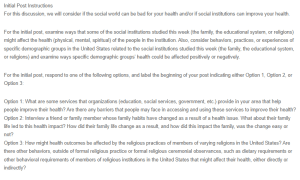Religious Factors Affecting Health Outcomes
One significant factor impacting Americans’ health outcomes is religious practices and broader lifestyle choices influenced by religion. This impact differs across religions, reflecting the diverse methods in which religion shapes behavior. One example is religions that do not believe in Western medicine and instead believe in healing through faith. Besides, some denominations in Christianity reject modern medicine, including Jehovah’s Witnesses and Christian Scientists, with the belief that there is a divine plan for it (Loue & Loue, 2020). This means that members of such communities, when affected by a disease, pose a great health risk to other people because they refuse to seek medical treatment, especially for diseases that can cause pandemics. In addition, they refuse to get immunizations, making them a danger to infants who have yet to be immunized.
Other religious practices that can affect health outcomes include dietary requirements, whereby religions like Judaism and Islam have dietary restrictions, especially in regard to alcohol, which contributes significantly to reducing substance abuse. Seeing that drug abuse is a global problem: having over a billion people in Islam, the restrictions do play a part in not only saving many people from being drug addicts but also reducing other health issues that come from drug abuse, for instance, the spread of sexually transmitted diseases, addiction and mental health issues.
In addition, other consequences like drunk driving, which causes many deaths every year, and injuries, which sometimes leave one disabled, are also reduced (Al-Ansari et al., 2020). A second behavioral religious practice that impacts health outcomes is abstinence from sex till marriage. This behavior prevents the spread of sexually transmitted diseases and unwanted pregnancies and reduces the number of abortions as well. Lastly, religions often provide strong social networks, which have been positively linked to improving mental health, lowering stress levels and better overall well-being (Kendall, 2016).
In conclusion, religion does have a considerable impact on society’s health outcomes. Religious practices and behavioral requirements implemented by religion both directly or indirectly influence health. Notably, the overall impact of religion on health is complex and multifaceted, with the potential for both positive and negative outcomes depending on the specific practices and the individual’s adherence to them.
References
Al-Ansari, B., Noroozi, A., Thow, A. M., Day, C. A., Mirzaie, M., & Conigrave, K. M. (2020). Alcohol treatment systems in Muslim majority countries: Case study of alcohol treatment policy in Iran. International Journal of Drug Policy, 80, 102753.
Kendall, D. (2016). Sociology in Our Times: The Essentials. United States: Cengage Learning.
Loue, S., & Loue, S. (2020). Religious Refusal of Medical Treatment. Case Studies in Society, Religion, and Bioethics, 103-170.
ORDER A PLAGIARISM-FREE PAPER HERE
We’ll write everything from scratch
Question
Initial Post Instructions
For this discussion, we will consider if the social world can be bad for your health and/or if social institutions can improve your health.
For the initial post, examine ways that some of the social institutions studied this week (the family, the educational system, or religions) might affect the health (physical, mental, spiritual) of the people in the institution. Also, consider behaviors, practices, or experiences of specific demographic groups in the United States related to the social institutions studied this week (the family, the educational system, or religions) and examine ways specific demographic groups’ health could be affected positively or negatively.

Religious Factors Affecting Health Outcomes
For the initial post, respond to one of the following options, and label the beginning of your post indicating either Option 1, Option 2, or Option 3:
Option 1: What are some services that organizations (education, social services, government, etc.) provide in your area that help people improve their health? Are there any barriers that people may face in accessing and using these services to improve their health?
Option 2: Interview a friend or family member whose family habits have changed as a result of a health issue. What about their family life led to this health impact? How did their family life change as a result, and how did this impact the family, was the change easy or not?
Option 3: How might health outcomes be affected by the religious practices of members of varying religions in the United States? Are there other behaviors, outside of formal religious practice or formal religious ceremonial observances, such as dietary requirements or other behavioral requirements of members of religious institutions in the United States that might affect their health, either directly or indirectly?

